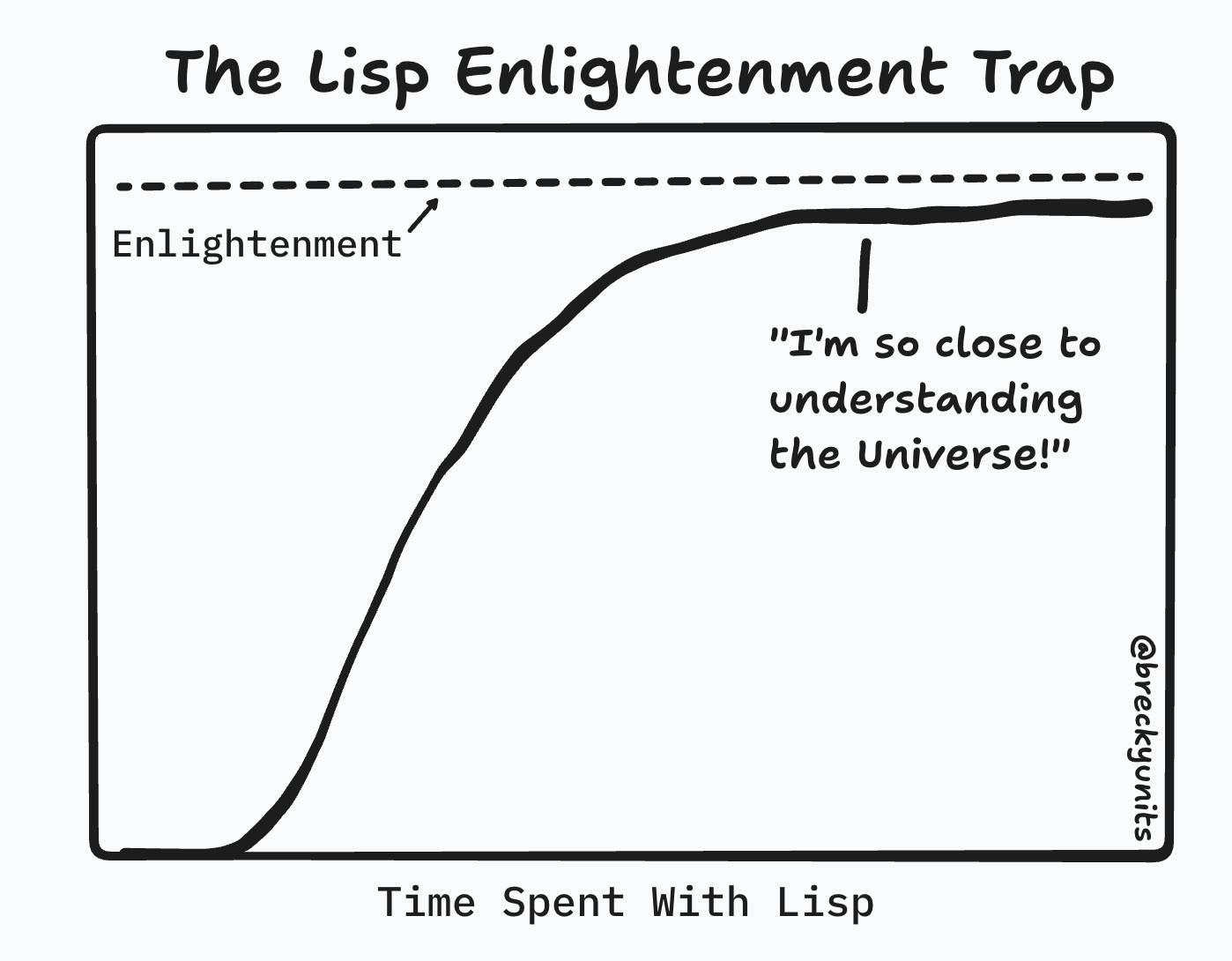With Scroll I am trying to make a product I love and a product other people love so much it spreads via word-of-mouth.
Word-of-mouth spread! The holy grail of startups.
It has been harder than I expected.
Continue reading...What Science May Be
by Breck Yunits
We can embody all of science into a single fully connected text file.
Continue reading...If you could have an AI running continuously on one prompt, what would it be?
Here is my best idea so far. What is yours? Ideas and criticisms encouraged!
Continue reading...I make many scratch folders and often hit this:
$ cd ~
$ ~ mkdir tmp
mkdir: tmp: File exists
$ ~ mkdir tmp2
mkdir: tmp2: File exists
$ ~ mkdir tmp22
mkdir: tmp22: File existsContinue reading...by Breck Yunits
All jobs done by large monolithic software programs can be done better by a collection of small microprograms (mostly 1 line long) working together.
Continue reading...Trust, and understand.
by Breck Yunits
Is there a better way to build a blockchain? Yes.
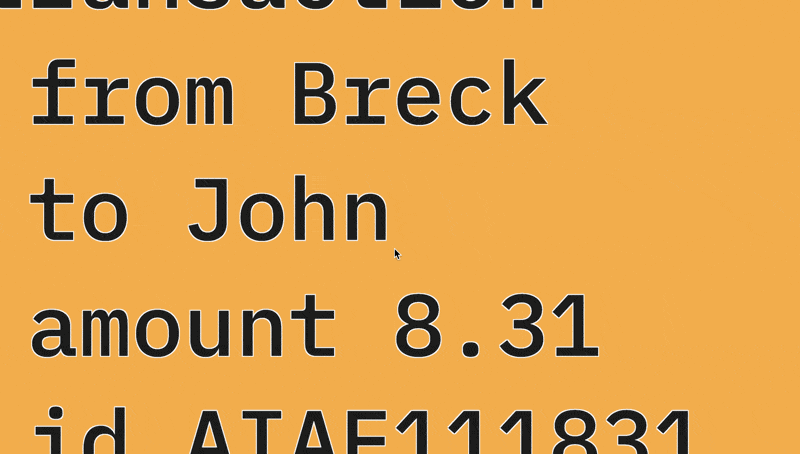
A Particle Chain is a single plain text document of particles encoded in Particle Syntax with new transactions at the top of the document and an ID generated from the hash of the previous transaction.
Particle Chain is a syntax-free storage format for the base layer of a blockchain to increase trust among non-expert users without sacrificing one iota of capabilities. A Particle Chain can be grokked by >10x as many people, thus leading to an order of magnitude increase in trust and developers on a chain.Continue reading...
Are some intellectual environments better than others? Yes.
ETA! states that E, the evolution time of ideas, is the time T needed to test alterations of ideas, divided by the factorial of the number of ideas in the Assembly Pool A!.
Longer evolution times means worse ideas last longer before evolving into better ideas.
Continue reading...
June 12, 2024 — After years of development, I'm looking for beta testers for The World Wide Scroll (WWS).
Continue reading...Websites don't need web servers.
June 11, 2024 — You can now download this entire blog as a zip file for offline use.
The zip file includes the Scroll source code for every post; the generated HTML; all images; CSS; Javascript; even clientside search.
Instructions
- Download
- Unzip
- Open
index.html
Can we quantify intelligence? Yes.
Program P is a bit vector that can make a bit vector (Predictions) that attempts to predict a bit vector of actual measurements (Nature).
Coverage(P) is the sum of the XNOR of the Predictions vector with the Nature vector.
Intelligence(P) is equal to Coverage(P) divided by Size(P).
Continue reading...by Breck Yunits
May 31, 2024 — Yesterday, on a plane, I found an equation I sought for a decade.
Patch is a tiny Javascript class (1k compressed) with zero dependencies that makes pretty deep links easy.
Continue reading...See where technology is going before your competitors

Above is a (blurred) screenshot of brecks.lab. For $499,999 a year, you get access to the private Git repo and issue boards.
May 26, 2024 — You once could buy transistors, capacitors, and other components at your local neighborhood store. The decline in US computer and electronics manufacturing correlates with the decline in RadioShacks. To catch up to other nations, maybe it is time for a next-gen RadioShack.
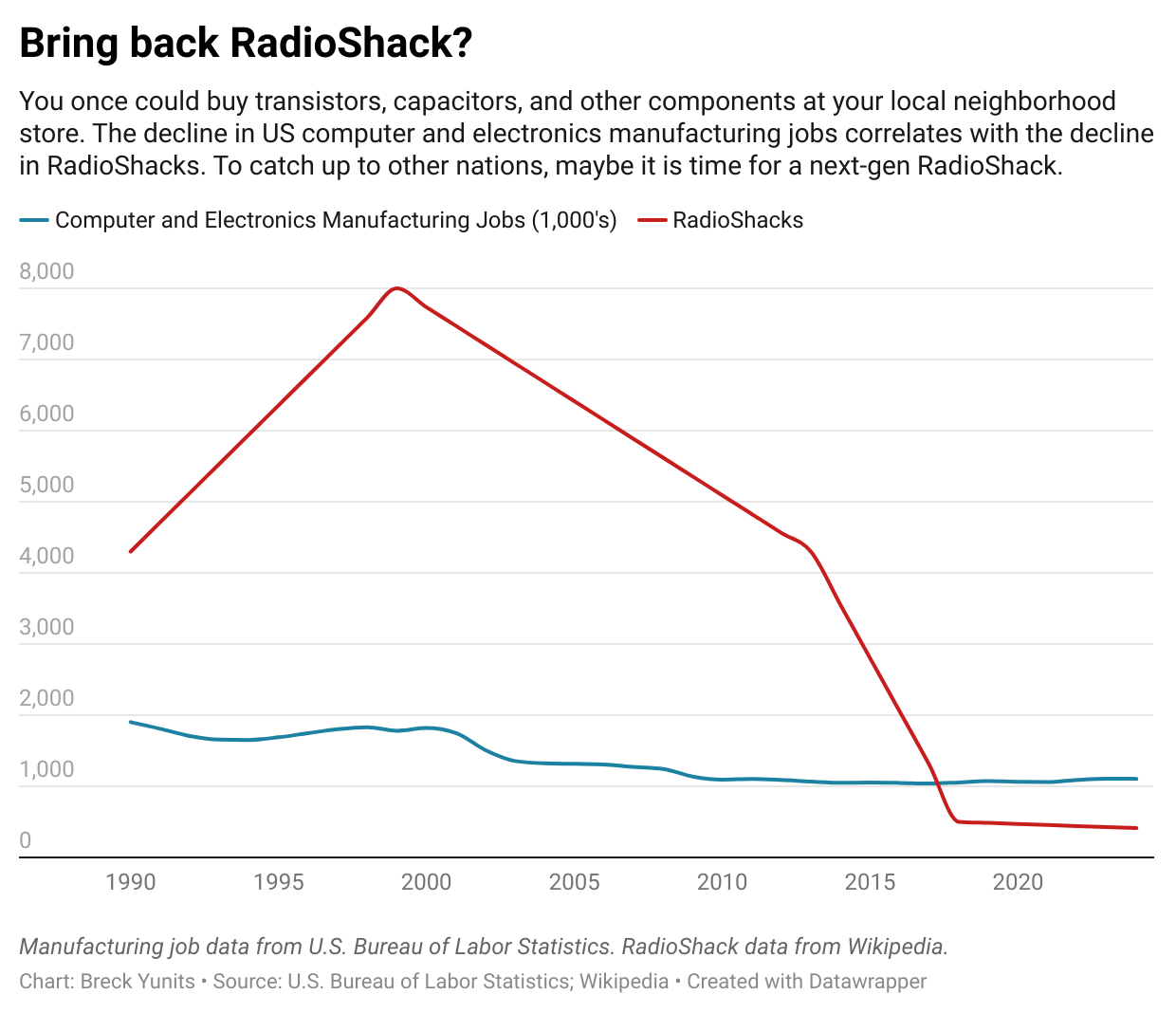
Analyzing the version numbers of 621 programming languages
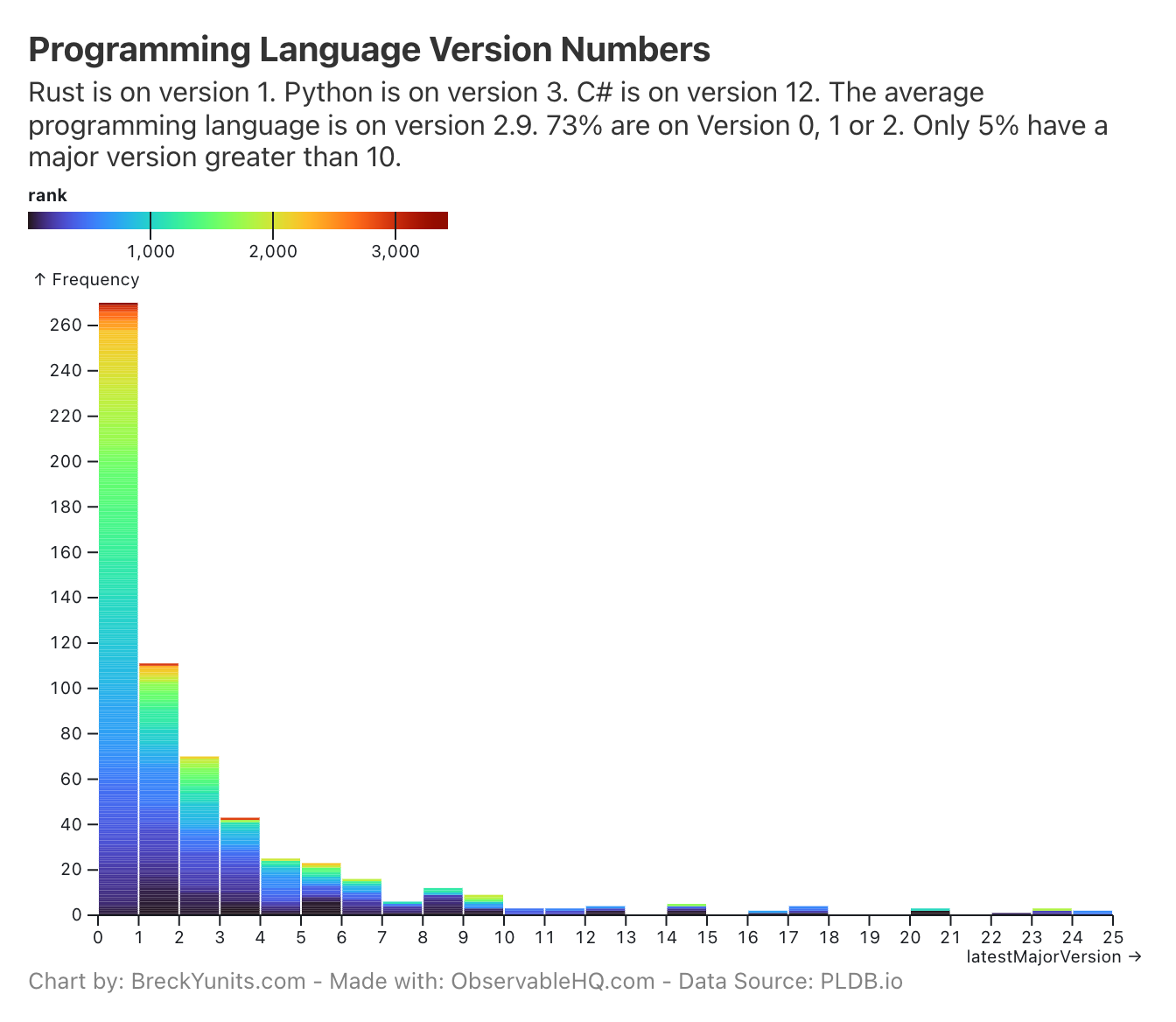
May 25, 2024 — I just pushed version 93.0.0 of my language Scroll. Version 93!
Continue reading...A Suggested Improvement to Progress Bars
May 24, 2024 — When I was a programmer at Microsoft I participated in a lot of internal betas.
So I saw a lot of animated "progress" bars in software that were actually hung.
I bet you could invent a better progress bar, I thought.
But life went on and I forgot.
Continue reading...by Breck Yunits
All tabular knowledge can be stored in a single long plain text file.
The only syntax characters needed are spaces and newlines.
This has many advantages over existing binary storage formats.
Using the method below, a very long scroll could be made containing all tabular scientific knowledge in a computable form.
Continue reading...May 12, 2024 — The Four Seasons website says
Treat others as you wish to be treated
Sometimes Four Seasons sends me random emails.
When I reply with a random email of my own I get
DoNotReply@fourseasons.com does not receive emails.Continue reading...
Datasets are automated tests for world models
by Breck Yunits
April 23, 2024 — I wrapped my fingers around the white ceramic mug in the cold air. I felt the warmth on my hands. The caramel colored surface released snakes of steam. I brought the cup to my lips and took a slow sip of the coffee bean flavored water inside.
Happiness is a hot cup of coffee in a ceramic mug on a cold day.
Continue reading...Menu Instructions
Congrats on landing a job at Big O's Kitchen!
Our menu has 7 dishes.
Below are the instructions for making each dish.
Continue reading...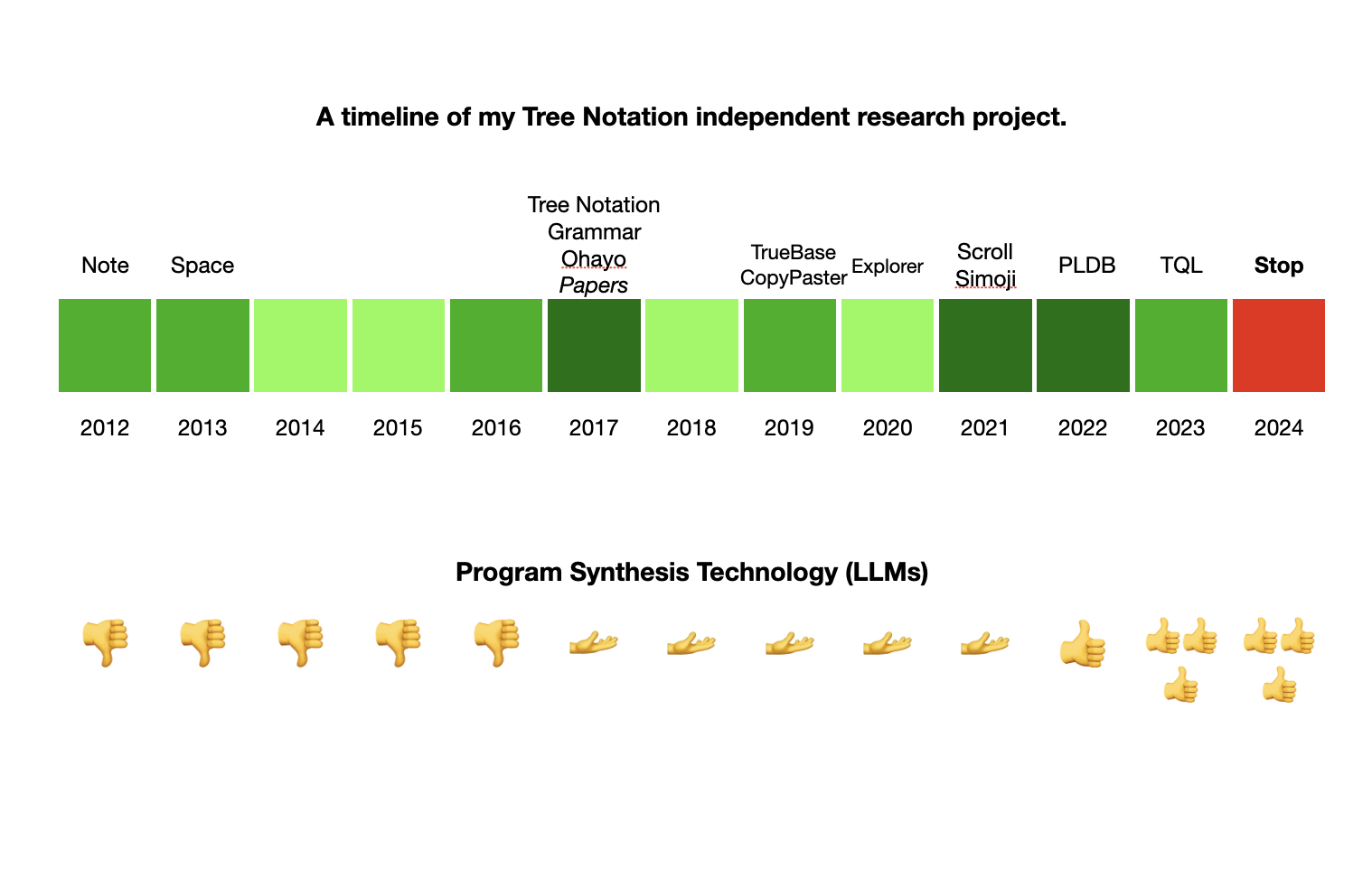
April 2, 2024 — It has been over 3 years since I published the 2019 Tree Notation "Annual" Report. An update is long overdue. This is the second and last report as I am officially concluding the Tree Notation project.
I am deeply grateful to everyone who explored this idea with me. I believe it was worth exploring. Sometimes you think you may have discovered a new continent but it turns out to be just a small, mildly interesting island.
Continue reading...February 24, 2024 — In the near future AI will be able to generate an extensive list and rating of all of the skills in someone's brain.

The ugly prototype I made at a hackathon in 2023 to explore this idea.
February 21, 2024 — Everyone wants Optimal Answers to their Questions. What is an Optimal Answer? An Optimal Answer is an Answer that uses all relevant Cells in a Knowledge Base. Once you have the relevant Cells there are reductions, transformations, and visualizations to do, but the difficulty in generating Optimal Answers is dominated by the challenge of assembling data into a Knowledge Base and making relevant Cells easily findable.

Activated Cells in a Knowledge Base.
January 12, 2024 — For decades I had a bet that worked in good times and bad: time you invest in word skills easily pays for itself via increased value you can provide to society. If the tide went out for me I'd pick up a book on a new programming language so that when the tide came back in I'd be better equipped to contribute more. I also thought that the more society invested in words, the better off society would be. New words and word techniques from scientific research helped us invent new technology and cure disease. Improvements in words led to better legal and commerce and diplomatic systems that led to more justice and prosperity for more people. My read on history is that it was words that led to the start of civilization, words were our present, and words were our future. Words were the safe bet.
Continue reading...Could in vitro brains power AI?
The advance of AGI is currently stoppable
January 1, 2024 — Short of an extraterrestrial projectile hitting earth, Artificial Neural Networks (ANNs) seem to be on an unstoppable trajectory toward becoming a generally intelligent species of their own, without being dependent on humans. But that's because the world's most powerful entities, foremost being the United States Military (USM), are allowing them to grow.
Continue reading...December 28, 2023 — I thought we could build AI experts by hand. I bet everything I had to make that happen. I placed my bet in the summer of 2022. Right before the launch of the Transformer AIs that changed everything. Was I wrong? Almost certainly. Did I lose everything? Yes. Did I do the right thing? I'm not sure. I'm writing this to try and figure that out.
Continue reading...June 16, 2023 — Here is an idea for a simple infrastructure to power all government forms, all over the world. This system would work now, would have worked thousands of years ago, and could work thousands of years in the future.
Continue reading...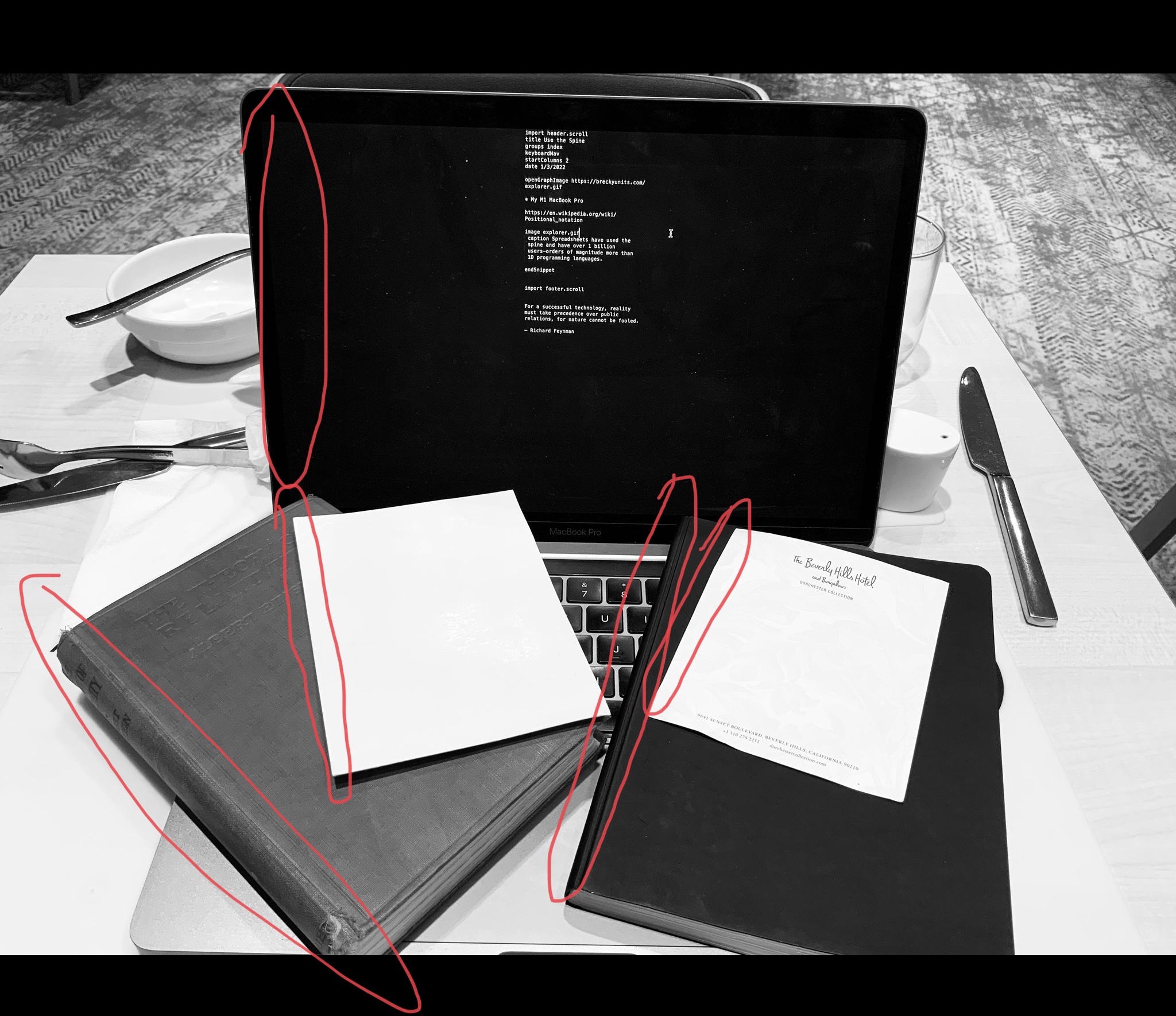
My M1 MacBook screen, paper notebook, notepads, and my 1920 copy of Einstein's Theory of Relativity, all have spines.
January 3, 2023 — Greater than 99% of the time symbols are read and written on surfaces with spines.
You cannot get away from this.
Yet still, amongst programming language designers there exists some sort of "spine blindness".
They overlook the fact that no matter how perfect their language, it will always be read and written by humans on surfaces with spines, as surely as the sun rises.
Why they would fight this and not embrace this is beyond me.
Nature provides, man ignores.
Continue reading...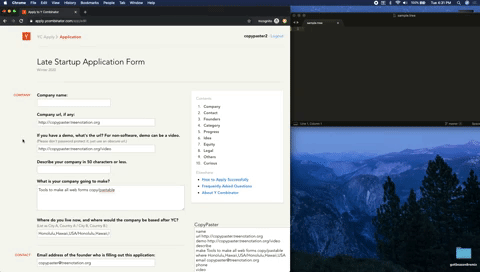
Every single web form on earth can (and will) be represented in a single textarea as plain text with no visible syntax using Particle Syntax. Traditional forms can still be used as a secondary view. In this demo gif we see someone switching between one textarea and a traditional form to fill out an application to YCombinator. As this pattern catches on, the network effects will take over and conducting business on the web will become far faster and more user friendly (web 4.0?).
9/5/2024: This is now live in Scroll! You can start using it now!
December 30, 2022 — Forget all the "best practices" you've learned about web forms.
Everyone is doing it wrong.
The true best practice is this: every web form on earth can and will be replaced by a single textarea.
Current form technology will become "classic forms" and can still be used as a fallback.
Continue reading...November 16, 2022 — I dislike the term first principles thinking. It's vaguer than it needs to be. I present an alternate term: root thinking. It is shorter, more accurate, and contains a visual:
Sometimes we get something wrong near the root which limits our late stage growth. To reach new heights, we have to backtrack and build up from a different point.
Replies always welcome
The waitress puts her earmuffs on.
She walks to the table, slams the food down, spins and runs away.
Sounds like an annoying customer experience, right?
No business would actually do this...right?
Well, in the digital world companies do this all the time.
They do it by blasting emails to their customers from noreply@ email addresses.
The Golden Rule of Email
A PSA for all businesses and startups. You could call it the Golden Rule of Email.
Email others only if they can email you.
Never send emails from a noreply@ or donotreply@ email address.
If you can't handle the replies, don't send the email!
Let's make email human again!
At the very least, have an AI inbox
If your business doesn't have the staff to read and reply to emails, you can at least write automatic programs that can do something for the customer.
No Exceptions
My claim is that noreply@ email addresses are always sub-optimal.
It is never the right design decision. There is always a better way.
Do you think you have an exception? You are wrong! (But let me hear it in the comments)
What do you think of this post? Email me at breck7@gmail.com.
Related Posts
Appendix 1: Reader Responses
Here are some reader examples with my responses:
My bank (Bank of Ireland) sends automated bi-monthly statements using noreply@boi.com
Bank of Ireland could end each email with a question such as "Anything we can do better? Let us know!". The responses could be aggregated and inform product development.
I follow many profiles on LinkedIn which sends me an occasional email on activities and updates that I might have missed using notifications-noreply@linkedin.com
LinkedIn could send these from a replyToUnsubscribe@linkedin.com. Replies will stop that kind of notifications.
GitHub sends me occasional emails about 3rd-party apps that have been granted access to my account using noreply@github.com
Github could send from replyToDeauthorize@github.com.
Google Maps sends monthly updates on my car journeys via noreply-maps-timeline@google.com
Could be a replyToStopTracking@google.com
Monthly newsletters to which I am subscribed via LinkedIn come in via newsletters-noreply@linkedin.com
Replies could get feedback to the newsletter author.
e-Books available from a monthly subscription are available on noreply@thewordbooks.com
Replies could be replyWithYourReview@thewordbooks.com.
Appendix 2: My one-man protest against no-reply email addresses
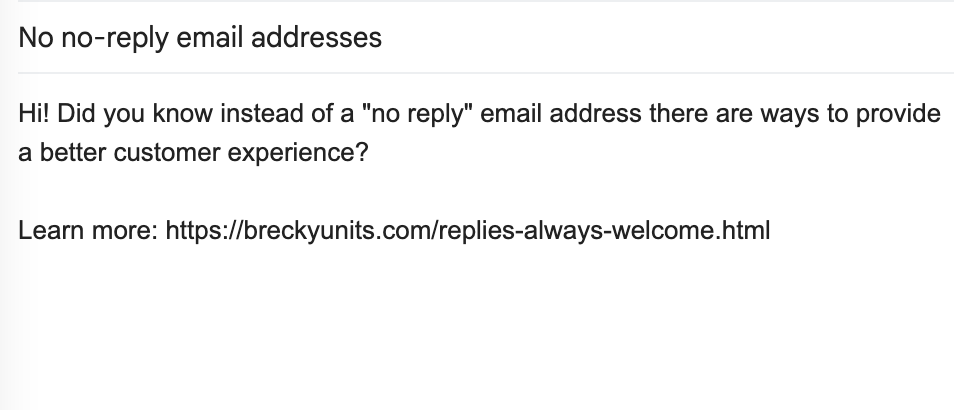
My automated campaign against no reply email addresses. Anytime a company sends a message from a noreply address they get this as a response. I am aware of the irony.
A Small Open Source Success Story
Adding 3 missing characters made code run 20x faster.
Map chart slowdown
June 9, 2022 — "Your maps are slow".
In the fall of 2020 users started reporting that our map charts were now slow. A lot of people used our maps, so this was a problem we wanted to fix.
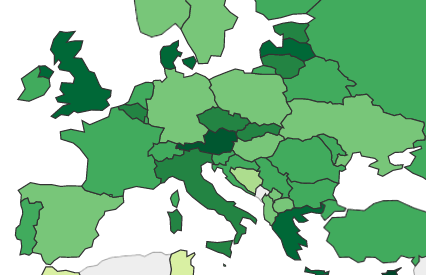
Suddenly these charts were taking a long time to render.
k-means was the culprit
To color our maps an engineer on our team utilized a very effective technique called k-means clustering, which would identify optimal clusters and assign a color to each. But recently our charts were using record amounts of data and k-means was getting slow.
Using Chrome DevTools I was able to quickly determine the k-means function was causing the slowdown.
Continue reading...An alternative to inline markup
December 15, 2021 — Both HTML and Markdown mix content with markup:
A link in HTML looks like <a href="hi.html">this</a>A link in Markdown looks like [this](hi.html).August 11, 2021 — In this essay I'm going to talk about a design pattern in writing applications that requires effectively no extra work and more than triples the power of your code. It's one of the biggest wins I've found in programming and I don't think this pattern is emphasized enough. The tldr; is this:
When building applications, distinguish methods that will be called by the user.Continue reading...
February 22, 2021 — Today I'm launching the beta of something new called Scroll.
Continue reading...December 9, 2020 — Note: I wrote this early draft in February 2020, but COVID-19 happened and somehow 11 months went by before I found this draft again. I am publishing it now as it was then, without adding the visuals I had planned but never got to, or making any major edits. This way it will be very easy to have next year's report be the best one yet, which will also include exciting developments in things like non-linear parsing and "forests".
In 2017 I wrote a post about a half-baked idea I named Tree Notation.
Since then, thanks to the help of a lot of people who have provided feedback, criticism and guidance, a lot of progress has been made flushing out the idea. I thought it might be helpful to provide an annual report on the status of the research until, as I stated in my earlier post, I "have data definitively showing that Tree Notation is useful, or alternatively, to explain why it is sub-optimal and why we need more complex syntax."
Continue reading...January 29, 2020 — In this long post I'm going to do a stupid thing and see what happens. Specifically I'm going to create 6.5 million files in a single folder and try to use Git and Sublime and other tools with that folder. All to explore this new thing I'm working on.
TreeBase is a new system I am working on for long-term, strongly-typed collaborative knowledge bases. The design of TreeBase is dumb. It's just a folder with a bunch of files encoded with Tree Notation. A row in a normal SQL table in TreeBase is roughly equivalent to a file. The filenames serve as IDs. Instead of each using an optimized binary storage format it just uses plain text like UTF-8. Field names are stored alongside the values in every file. Instead of starting with a schema you can just start adding files and evolve your schema and types as you go.
Continue reading...January 20, 2020 — In this post I briefly describe eleven threads in languages and programming. Then I try to connect them together to make some predictions about the future of knowledge encoding.
This might be hard to follow unless you have experience working with types, whether that be types in programming languages, or types in databases, or types in Excel. Actually, this may be hard to follow regardless of your experience. I'm not sure I follow it. Maybe just stay for the links. Skimming is encouraged.
Continue reading...January 3, 2020 — Speling errors and errors grammar are nearly extinct in published content. Logic errors, however, are prolific.
Continue reading...July 18, 2019 — In 2013 I sent a brief email to 25 programmers whose programs I admired.
"Would you be willing to share the # of hours you have spent practicing programming? Back of the envelope numbers are fine!"
Some emails bounced back.
Some went unanswered.
But five coders wrote back.
This turned out to be a tiny study, but given the great code these folks have written, I think the results are interesting--and a testament to practice!
| Name | GitHub | Hours | YearOfEstimate | BornIn |
|---|---|---|---|---|
| Donald Knuth | 56000 | 2013 | 1938 | |
| Rob Pike | robpike | 30000 | 2013 | 1956 |
| Peter Norvig | norvig | 30000 | 2013 | 1956 |
| Stephen Wolfram | 50000 | 2013 | 1959 | |
| Lars Bak | larsbak | 30000 | 2013 | 1965 |
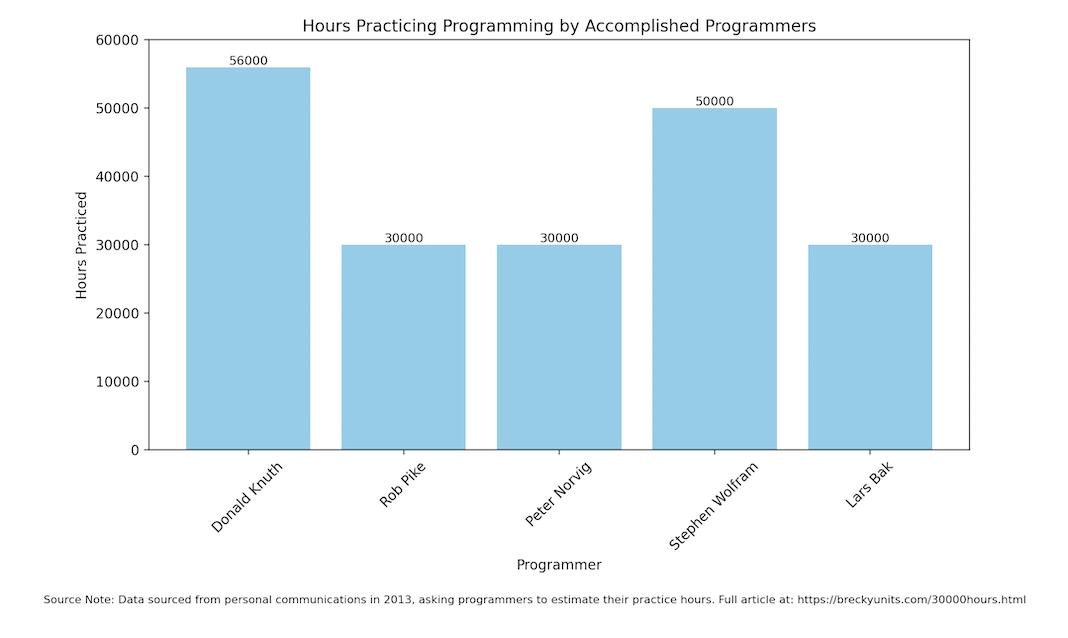
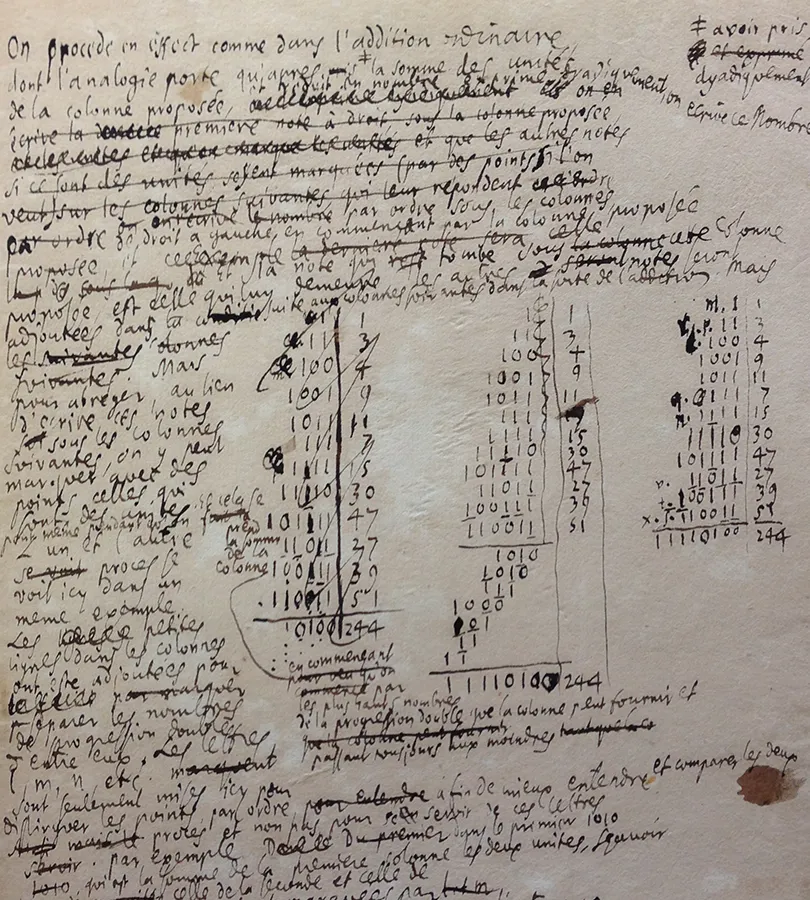
Recently some naive fool proposed removing the “2's” from our beloved Trinary Notation.
Continue reading...June 23, 2017 — I just pushed a project I've been working on called Ohayo.
You can also view it on GitHub: https://github.com/treenotation/ohayo
I wanted to try and make a fast, visual app for doing data science. I can't quite recommend it yet, but I think it might get there. If you are interested you can try it now.
Continue reading...June 21, 2017 — Eureka! I wanted to announce something small, but slightly novel, and potentially useful.
What did I discover? That there might be useful general purpose programming languages that don't use any visible syntax characters at all.
Continue reading...A Suggestion for a Simple Notation
September 24, 2013 — What if instead of talking about Big Data, we talked about 12 Data, 13 Data, 14 Data, 15 Data, et cetera? The # refers to the number of zeroes we are dealing with.
You can then easily differentiate problems. Some companies are dealing with 12 Data, some companies are dealing with 15 Data. No company is yet dealing with 19 Data. Big Data starts at 12 Data, and maybe over time you could say Big Data starts at 13 Data, et cetera.
Continue reading...September 23, 2013 — Making websites is slow and frustrating.
Continue reading...June 2, 2013 — I have an idea for a simpler Internet, where a human could hold in their head, how it all works, all at once.
It would work much the same way as the Internet does now except for one major change. Almost all protocols and encodings such as TCP/IP, HTTP, SMTP, MIME, XML, Zone files, et cetera are replaced by a lightweight language called Scroll.
Continue reading...April 2, 2013 — For me, the primary motivation for creating software is to save myself and other people time.
I want to spend less time doing monotonous tasks.
Less time doing bureaucratic things. Less time dealing with unnecessary complexity. Less time doing chores.
I want to spend more time engaged with life.
Continue reading...March 30, 2013 — Why does it take 10,000 hours to become a master of something, and not 1,000 hours or 100,000 hours?
The answer is simple. Once you've spent 10,000 hours practicing something, no one can crush you like a bug.

The figure on top has 10,000 hours of experience and crushes people with 100 hours or 1,000 hours like a bug. But they cannot crush another person with 10,000 hours.
March 16, 2013 — A kid says Mommy or Daddy or Jack or Jill hundreds of times before grasping the concept of a name.
Likewise, a programmer types name = Breck or age=15 hundreds of times before grasping the concept of a variable.
What do you call it when someone finally sees the concept?
John Calcote, a programmer with decades of experience, calls it a minor epiphany.
Continue reading...December 14, 2012 — Note is a structured, human readable, concise language for encoding data.
Continue reading...November 20, 2012 — "Is simplicity ever bad?" If you had asked me this a year ago, I probably would have called you a fucking moron for asking such a dumb question. "Never!", I would have shouted. Now, I think it's a fair question. Simplicity has it's limits. Simplicity is not enough, and if you pursue simplicity at all costs, that can be a bad thing. There's something more than simplicity that you need to be aware of. I'll get to that in a second, but first, I want to backtrack a bit and state clearly that I do strongly, strongly believe and strive for simplicity. Let me talk about why for a second.
Continue reading...October 20, 2012 — I love to name things.
I spend a lot of time naming ideas in my work. At work I write my code using a program called TextMate. TextMate is a great little program with a pleasant purple theme. I spend a lot of time using TextMate. For the past year I've been using TextMate to write a program that now consists of a few hundred files. There are thousands of words in this program. There are hundreds of objects and concepts and functions that each have a name. The names are super simple like "Pen" for an object that draws on the screen, and "delete" for a method that deletes something. Some of the things in our program are more important than others and those really important ones I've renamed dozens of times searching for the right fit.
Continue reading...March 30, 2011 — Railay is a tiny little beach town in Southern Thailand famous for its rock climbing.
I've been in Railay for two weeks.
When the weather is good, I'm outside rock climbing.
When the weather is bad, I'm inside programming.
Continue reading...August 25, 2010 — Ruby is an awesome language. I've come to the conclusion that I enjoy it more than Python for the simple reason that whitespace doesn't matter.
Python is a great language too, and I have more experience with it, and the whitespace thing is a silly gripe. But I've reached a peak with PHP and am looking to master something new. Ruby it is.
Continue reading...July 2, 2010 — A year ago I wrote a post titled The Truth about Web Design where I briefly argued that "design doesn't matter a whole lot."
My argument was: "you go to a website for the utility of it. Design is far secondary. There are plenty of prettier things to look at in the real world."
I do think the real world is a pretty place, but about design, I was completely wrong.
Continue reading...June 15, 2010 — I think it's interesting to ponder the value of information over it's lifetime.
Different types of data become outdated at different rates. A street map is probably mostly relevant 10 years later, while a 10 year old weather forecast is much less valuable.
Phone numbers probably last about 5 years nowadays. Email addresses could end up lasting decades. News is often largely irrelevant after a day. For a coupon site I worked on, the average life of a coupon seemed to be about 2 weeks.
If your data has a long half life, then you have time to build it up. Wikipedia articles are still valuable years later.
What information holds value the longest? What are the "twinkies" of the data world?
Books, it seems. We don't regularly read old weather forecasts, census rolls, or newspapers, but we definitely still read great books, from Aristotle to Shakespeare to Mill.
Facts and numbers have a high churn rate, but stories and knowledge last a lot longer.
Continue reading...March 17, 2010 — If you automate a process which you repeat Y times, that takes X minutes, what would your payoff be?
Payoff = XY minutes saved, right?
Surprisingly I've found that is almost never the case. Instead, the benefits are almost always greater than XY. In some cases, much greater. The benefits of automating a process are greater than the sum of the process' parts.
Actual Payoff = XY minutes saved + E
What is E? It's the extra something you get from not having to waste time and energy on XY.
Continue reading...March 16, 2010 — I wrote a simple php program called phpcodestat that computes some simple statistics for any given directory.
Continue reading...March 8, 2010 — If a post on HackerNews gets more points, it gets more visits.
But how much more? That's what Murkin wanted to know.
I've submitted over 10 articles from this site to HackerNews and I pulled the data from my top 5 posts (in terms of visits referred by HackerNews) from Google Analytics.
Here's how it looks if you plot visits by karma score:
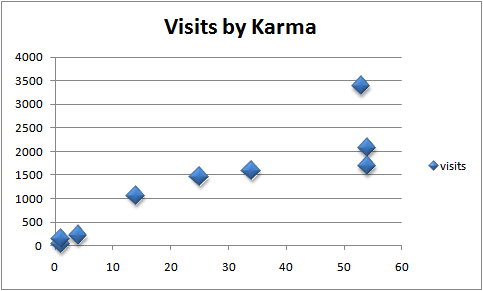
January 15, 2010 — In computer programming, one of the most oft-repeated mottos is DRY: "Don't Repeat Yourself."
The downside of DRY's popularity is that programmers might start applying the principle to conversations with other humans.
This fails because computers and people are polar opposites.
With computers, you get zero benefit if you repeat yourself. With people, you get zero benefit if you don't repeat yourself!
Continue reading...December 20, 2009 — Programming, ultimately, is about solving problems. Often I make the mistake of judging a programmer's work by the elegance of the code. Although the solution is important, what's even more important is the problem being solved.
Problems are not all created equal, so while programming you should occasionally ask yourself, "is this problem worth solving?"
Continue reading...December 15, 2009 — The best Search Engine Optimization(SEO) system I've come across comes from Dennis Goedegebuure, SEO manager at eBay. Dennis' system is called LUMPS. It makes SEO dead simple.
Just remember LUMPS:
- Links
- Uurls
- Metadata
- Page Content
- Sitemaps
December 13, 2009 — Do you "flip the bit" on people?
If you don't know what that means, you probably do it unknowingly!
Continue reading...December 11, 2009 — Jason Fried from 37signals gave a great talk at startup school last month. At one point he said "software has no edges." He took a normal, everyday bottle of water and pointed out 3 features:
- 1. The bottle held the water.
- 2. The lightweight plastic made it easy to carry, and you can tell how full it was by picking it up.
- 3. The clear bottle let you see how much was left and what was in it.
If you added a funnel to help pour the water, that might be useful in 5% of cases, but it would look a little funny. Then imagine you attach a paper towel to each funnel for when you spill. Your simple water bottle is now a monstrosity.
The clear edges of physical products make it much harder for feature creep to happen. But in software feature creep happens, and happens a lot.
Continue reading...December 8, 2009 — Finding experienced mentors and peers might be the most important thing you can do if you want to become a great programmer. They will tell you what books to read, explain the pros and cons of different languages, demystify anything that seems to you like "magic", help you when you get in a jam, work alongside you to produce great things people want, and challenge you to reach new heights.
Continue reading...December 4, 2009 — Do you want to become a great coder? Do you have a passion for computers but not a thorough understanding of them? If so, this post is for you.
Continue reading...April 14, 2009 — Here’s what I’m going to assume: craigslist, Google, and eBay do not have very pretty designs. How can a website be so successful if the design isn’t pretty? My position is that because design doesn’t matter a whole lot.
Continue reading...while ($brecks_programming_skills < ‘great’) { write_learning_how_to_program_series(); }
August 28, 2007 — I thought today I’d write my first post on programming. I have always been very passionate about computers, but to be honest my programming skills are embarrassingly weak. Mainly it’s because I haven’t spent any time developing them. Although I wrote my first webpage in 1996, it wasn’t until 2002 at Duke that I wrote my first computer program.
Continue reading...